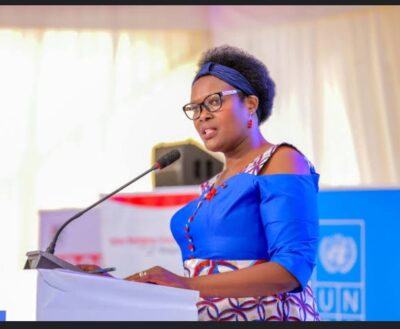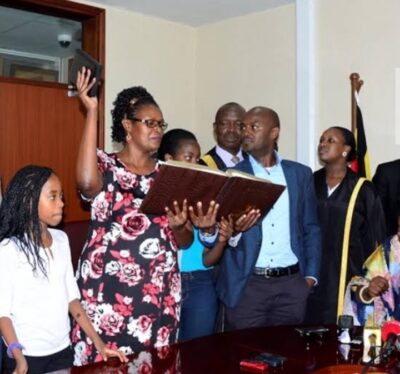Margaret Muhanga shatters gender norms: From Journalist to Minister, leading the charge for women in Ugandan politics.
BY MOLLY KAMAKUNE
 Hon Margaret Muhanga, a journalist by profession, spent about 8 years reporting on parliament in Kampala before transitioning to politics. Her initial attempt to contest as a woman Member of Parliament for Kabarole district in 2001 was unsuccessful.
Hon Margaret Muhanga, a journalist by profession, spent about 8 years reporting on parliament in Kampala before transitioning to politics. Her initial attempt to contest as a woman Member of Parliament for Kabarole district in 2001 was unsuccessful.
However, she persisted, returning in 2006 and emerging victorious. Since then, she has been actively involved in leadership roles. In 2021, she made a significant move into the new administrative unit of Fort Portal Tourism City, where she not only competed but also triumphed over male counterparts to secure a position as a legislator for the North Division constituency.
During the 2021 parliamentary elections, Muhanga defied gender norms by outperforming men, challenging the prevailing notion that directly elected legislator seats are reserved for men. She is one of 16 women in Uganda who were directly elected in the 11th parliament. Currently, she serves as the state minister for Primary Health Care in the Ministry of Health.
Molly Kamakune interviewed Margarete Muhanga to delve into her political journey and career.
What inspired you to run for this office in a traditionally male-dominated constituency?
What inspired me to run for this traditionally male-dominated constituency was the firm belief that women are just as capable, if not more so, than men in leadership roles. Scientifically, we all possess the same brain, and I dare say that women may even have a better one. Additionally, women tend to serve with a great deal of empathy and kindness, as we are natural caregivers and are particularly attuned to issues that affect people’s lives.
For instance, if a man comes across a woman in labor on the road, it might not evoke the same level of empathy in him to stop and help. But as a woman who has experienced labor, I understand the urgency and the need for immediate assistance. Women are passionate about addressing issues that impact the public, and I believe that increasing the representation of women in leadership positions would bring about greater equity and fairness in our society
What have u done to increase the number of women like you in leadership?
To increase the number of women in leadership, I have personally taken steps to encourage women to contest for various positions, starting from the councilor level. I understand that starting at the grassroots level can be less daunting for women when competing against men. Despite facing defeat in the women’s Member of Parliament race in 2001, I persevered and found success in a direct constituency this time around.
I firmly believe that when more women hold leadership positions, they bring a unique perspective to policy making, particularly on issues that directly impact people’s lives. Women have a profound understanding of nurturing and caregiving, as it is often women who manage households and ensure the well-being of their families. You can easily discern the absence of a woman in a household by the level of disorganization.
What challenges have you encountered during the campaign?

During my campaign, I encountered various challenges, as is common in any field. In politics, however, one of the prominent challenges is dealing with individuals who resort to name-calling and spreading falsehoods about you. They may say things that you never even knew about yourself. But as someone who has offered themselves to serve in the public space, it’s crucial to acknowledge and accept these challenges while maintaining a steadfast focus on your goals. It’s essential to develop a thick skin and not let such negativity deter you from your mission.
My advice to fellow women entering politics is to ignore the naysayers and focus on making a positive impact. Let your actions and accomplishments speak for themselves. Strive to effect meaningful change, both during your tenure in office and beyond. Remember that your work should extend beyond mere electoral cycles; aim to leave a lasting legacy that benefits your constituents and society as a whole.
Have you conducted any training to equip fellow women leaders with such knowledge?
Yes, I have organized numerous conferences and provided free conference halls on many occasions to equip fellow women leaders with the necessary knowledge and skills. Additionally, the Ministry of Gender has conducted extensive training and studies, not only focusing on leadership but also on financial literacy and skills development aimed at eradicating poverty and empowering women.
Have you faced any resistance or backlash in your own party due to your gender?
Yes, I have faced considerable resistance and backlash within my own party due to my gender. However, I have learned that if you allow every negative voice to distract you, you’ll never reach your desired destination. No one can obstruct your path unless you permit them to do so. Life is full of challenges, but it’s essential to persevere, stay focused on your goals, and work tirelessly to achieve them.
When and how did you decide to join politics?
I made the decision to transition into politics after witnessing numerous challenges and injustices within the country, particularly in the Tooro sub-region where I reside. Having worked in the media industry, I observed firsthand the issues plaguing our society. It became increasingly clear to me that I had the potential to make a positive difference.
Leadership, I realized, requires sacrifice. Unfortunately, many in positions of power prioritize their own interests over the well-being of the people they serve. This selfishness perpetuates poverty and stifles development. Witnessing these injustices fueled my determination to step up and advocate for change.
During my time as a news reporter in Parliament for eight years, I gained valuable insights into the legislative process and resource allocation. This experience further motivated me to pursue a career in politics, as I saw firsthand the impact that effective governance can have on people’s lives.
Despite facing initial setbacks, such as being deemed too young when I first ran for the position of Woman Member of Parliament for Kabarole district in 2001, I remained undeterred. I persevered, returning to contest the race in 2006, and emerged victorious. Since then, my primary goal has been to improve the lives of my constituents and effect positive change through politics.
Are you in collaboration with any organizations that fight for women’s rights?
Yes, I am actively involved with several organizations that advocate for women’s rights and empowerment. These include FAWE (Forum for African Women Educationalists), Women in Democracy, Women in Journalism, Mothers Union, and numerous others. These organizations play a crucial role in nurturing and supporting women in leadership roles, providing them with the necessary skills and resources to succeed.
Participating in these organizations helps to groom women for leadership positions by offering training, mentorship, and networking opportunities. In politics, particularly, being in the spotlight means that every word and action is scrutinized, making it essential for women to be well-prepared and articulate in their roles.
What advice do you give to any woman who has a political leadership dream?
For every woman with active political dreams, I would advise starting small and gradually building your way up. Even if you’re currently in a profession outside of politics, such as teaching, it’s essential to be assertive and proactive in gaining knowledge, exposure, and confidence. Avoid rushing into political endeavors without a clear strategy in place.
My own experience reflects the importance of resilience and perseverance. Despite facing defeat in my first attempt, I remained determined and did not give up.
2026 What do you prioritize for gender equality
In 2026, one of my top priorities for gender equality in Uganda is addressing the neglected needs of the boy child. While significant efforts have rightly been directed towards supporting the girl child, it’s important to recognize that boys face their own set of challenges. While puberty is a universal experience for both genders, girls also contend with physiological challenges such as menstruation and the pains of labor.
To address this issue, we are actively working on policies, particularly within the Ministry of Education, to promote comprehensive sex education in schools. Although sex education has been present in the curriculum, we are enhancing these efforts to ensure that both boys and girls receive the necessary information and support to navigate adolescence and understand issues related to gender and sexuality.

